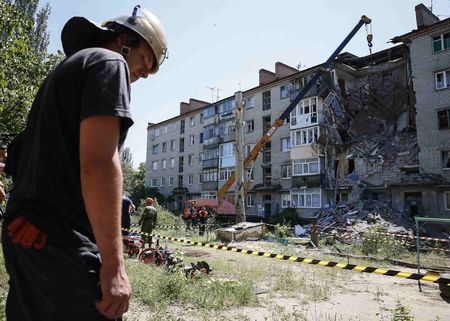By Richard Balmforth and Anton Zverev
KIEV/DONETSK Ukraine (Reuters) - Pro-Moscow separatists battled to break through lines of government forces near the border with Russia in eastern Ukraine on Wednesday, and a tentative step towards agreeing a ceasefire in the intensifying three-month conflict failed.
Fighting has escalated sharply since Ukrainian forces pushed rebels out of their stronghold in the town of Slaviansk 10 days ago. The past several days have seen Russia and Ukraine trade accusations of firing across the border.
Ukraine's military said 11 more troops were killed in the space of 24 hours, mostly in clashes near the frontier.
Ukraine has been trying to put down a revolt by heavily-armed fighters, many of them from Russia, who have sought independence for two eastern provinces since April.
Russia annexed Ukraine's Crimea peninsula in March after a pro-Russian president was ousted in Kiev. Moscow denies supporting the separatists in eastern Ukraine, but Kiev says many of the fighters and their leaders have travelled from Russia and brought heavy weapons across the border.
Ukrainian troops have focussed their efforts in recent days on securing the frontier to prevent the arrival of more fighters and weapons. Andriy Lysenko, spokesman for Ukraine's defence and security council, told journalists the separatists had attacked government positions along the border overnight.
Government troops had been ambushed by separatists at Izvarino on the border and there had been early morning clashes near the border settlement of Stepanivka when separatists tried to break out of encirclement by the army, he said.
"There was tank and mortar fire and from rockets on positions of the (Ukrainian) 'anti-terrorist operation'," Lysenko said. The number of casualties was being established.
Two days after the downing of a government An-26 transport plane, Ukrainian warplanes had been given the go-ahead to resume flights over the east, Lysenko said. Kiev says it believes the transporter was hit by a missile fired from Russia.
A separate SU-25 fighter plane was hit by a rebel rocket on Wednesday, but the pilot made a successful emergency landing and there was only slight damage to the aircraft, the defence ministry said. No-one was hurt.
ESCALATION
The escalation in recent days has once more raised the prospect that Moscow could intervene directly in Ukraine, after weeks in which President Vladimir Putin had appeared keen to disengage. Putin had withdrawn tens of thousands of troops he had massed at the frontier, but Kiev says their numbers have again been rising as troops are returning to the border area.
In telephone conversations with German Chancellor Angela Merkel and European Council President Herman Van Rompuy Ukraine's President Petro Poroshenko set out evidence of fighters crossing into Ukraine from Russia with heavy military equipment, his website said.
"Everything which is happening in Ukraine has been planned by Russia since 2004. Putin has a clear plan and that is to destroy Ukraine and establish his influence over post-Soviet space," Prime Minister Arseny Yatseniuk said in a speech carried by his website.
Around 270 Ukrainian servicemen and hundreds of civilians and rebels have been killed since the government launched an "anti-terrorist" operation in April to crush the rebels.
Lysenko said that in Slaviansk, the former rebel stronghold re-taken by government forces this month, "hundreds of bodies of...(rebel) fighters" had been found in shallow graves.
"Some of these graves have been mined by the terrorists," he said. He gave no further details. The government has given high figures for rebel casualties in the past that could not be verified.
Efforts to forge a truce have so far failed. A "contact group" of officials from Ukraine, Russia and the Organisation for Security and Co-operation in Europe (OSCE) said it tried on Tuesday to re-activate peace talks - but a planned video link-up with separatists never materialised.
"In the opinion of the contact group, this indicates a lack of willingness on the side of separatists to engage in substantive talks on a mutually agreed ceasefire," it said in a statement. It urged separatists to return to talks immediately.
Aleksander Borodai, "prime minister" of the rebels' self-proclaimed Donetsk People's Republic, later told journalists the video-link might now take place on Thursday evening. There was no immediate confirmation of this from the "contact group".
Since losing Slaviansk, hundreds of rebel fighters have moved to the industrial city of Donetsk, vowing to make a stand. The city which had a pre-conflict population of nearly 1 million, has been steadily emptying as thousands, fearing a government offensive, have fled.
There are now fewer and fewer people out on the streets and few cars in what was once a bustling city. Most banks, shops and bars have closed, cash-dispensers have been switched off and street traffic lights no longer work.

Lyudmila, 35, who was leaving Donetsk, said: "I have been forced to gather up my things and get away from this lawless genocide. I am simply saving my children. My husband is staying behind. I have left my home and my work. I am leaving to save my children."
(Additional reporting by Natalya Zinets in Kiev)
